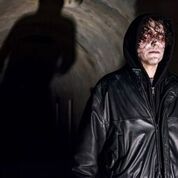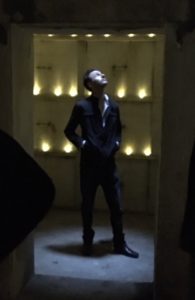
photo by Kevin Condon
After walking through David Lang’s Mile Long Opera on the High Line last week, Gregg Kallor’s double bill of The Tell-Tale Heart and still-in-progress Frankenstein at the Green-Wood Cemetery catacomb almost seemed mainstream. Well, somewhat. There was a genuine acoustic, a real piano, cultivated singers and a literary base line in operatic works drawn from Edgar Allen Poe and Mary Shelley.
The catacomb is a narrow hall with vaults along the way, all dimly lit, with a miniature stage at the far end where the opera unfolded with a small instrumental contingent. Most frequently asked question: Are the walls lined with rotting mummies? No. (That would be an Indiana Jones movie.)
The audience first gathered inside the Green-Wood gate, sampled whiskey (none for me, thanks), and then took trolleys over hill and dale in this wooded, often-Gothic, 19th-century cemetery, full of grand monuments that are time capsules of how people then thought about their place in this world and the next. The great contradiction: Small, rectangular, ground-level head stones mark the graves of Leonard Bernstein and his wife Felicia.
No doubt novelty is a big draw in this concert series, known as The Angel’s Share, produced by Andrew Ousley of Unison Media. Mainly, I was there to hear Kallor, a well-regarded, just-under-40 Connecticut-raised composer who was a student of Herschel Garfein and is also a jazz and concert pianist. He accompanied his own operas (a good thing) with his frequent concert partner, cellist Joshua Roman. As a soloist, he played a Bernstein tribute titled The Answer Is: Yes, and if you braced yourself for West Side Story clichés, you were happily surprised with an extravagant fantasy on the solo piano writing from Symphony No. 2 (“Age of Anxiety”) that showed just how fine a pianist Kallor is.
Both operas, as they now stand, aren’t full-length works. The Tell-Tale Heart is basically a mono-drama that, like the Edgar Allen Poe story, is a tale of unmotivated murder told by its narrator, sometimes passionately but mostly with eerily detailed detachment.

The piece was the work of a sure dramatist, with a rich, tonally-based harmonic vocabulary that could give the story all of the dramatic range it needed. Vocal lines were ready and willing to navigate any and all twists in the story. The unifying leitmotif, to the naked ear, was a melody that began conventionally but quickly took on a time-stretching quality like that in Stravinsky’s Petroushka, seamlessly changing time signatures in ways that give the impression of the music slipping into a different zone. And that was appropriate. The narrator swears he’s sane but is clearly unmoored as he kills and dismembers an old man (His father? A landlord?) only because he doesn’t like the way one of his eyes looks. Yes, compelling stuff, particularly as sung by Jennifer Johnson Cano – a woman, since Poe’s narrator, often assumed to be male, is not gender-specific.
As good as it is, Tell-Tale Heart was outclassed by the Frankenstein excepts, which had their ups and downs, but, when up, went deeper in their dramatic specificity. Most compelling was the Frankenstein monster’s monologue about making his way through a hostile world not knowing what or who he was, but with an intelligence that allowed him to pick up language and earmarks of civilization – however haphazardly, since his hideousness drove people away almost immediately. The observations in the words and the depth of feeling in the music were extremely powerful, especially as knitted together by a six-note motif that often seemed to be hovering on the sidelines in various guises, harmonically separate from what else was happening in the score.
As a dramatist, Kallor tends to give you the big picture of a given scene in the harmonic accompaniment, but he smartly stops short of specific musical characterization that can condescend to audiences, assuming that the words don’t have any innate power. Some of the most attractive music came from passively lyrical cello writing that suggested the comfortable, civilized Biedermeier world that the monster peers at through windows, trying to figure out where he belongs.
The minute Dr. Frankenstein appeared in one of the excerpts, the music and text became less interesting. You probably wouldn’t notice that much, if at all, in the context of a completed opera. It might even seem like a welcome dose of normality, with the doctor uttering phrases that are commonly heard from everybody and the music losing some of its dramatic dimension. But the monster’s promise to haunt the doctor on his wedding night brought back the intense chill factor, making the future project quite promising.
In pre-performance comments, Kallor talked about the story as something whose time has come, though not in ways we’re used to. We’re in an age when if you’re not in, you’re out, where being “other” in any significant way is a sociological minus. Humanity is objectified more than ever: It’s about what we are, not who we are. The monster pleads with Dr. Frankenstein to give him a mate, one created in the manner that he was. The monster needs many things, but love is by far the most important.
How the rest of the opera unfolds remains to be seen. But for the time being, the monster’s anguished monologue that encompasses so much of the story’s larger themes could easily be a ‘scena’ to perform in recitals – especially as sung by the plush-voiced Joshua Jeremiah. Singers are augmenting their standard romantic-era Schubert/Schumann//Wolf repertoire in any number of ways, and the penetrating dramatic truths of Frankenstein might co-exist with 19th-century lieder more easily than you’d think.

